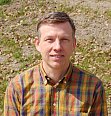Dr. Stefan Wirsel

Übersicht
Projekte
Identification and characterisation of secreted effector proteins of Colletotrichum graminicola
Plant pathogenic fungi exhibiting phases of biotrophic growth - like the hemibiotrophic Colletotrichum graminicola - need to avoid defence responses of their host. Currently, there is a lack of information about the reasons for the apparent failure of innate immunity to ward off the invading pathogen. We investigate the hypothesis that secreted fungal proteins may suppress plant defence reactions. At the moment, it is poorly understood which fungal genes are involved in these processes. The extent of their integration into regulatory networks remains uncertain. Furthermore, molecular communication between secreted fungal proteins and components of the host defence system remains elusive. We investigate the following questions: Which subset of genes encoding secreted fungal proteins is specifically expressed during pathogenesis? Which gene products are essential for the establishment of the biotrophic phase, and, respectively, for switching to the necrotrophic phase? Where are these gene products localized? Do some of these gene products determine the host range? Which gene products do interfere with the regulation of plant defence? Using the YSST-method about 100 genes of the pathogen were identified that encode secreted proteins. A selection of those is analysed for being an effector or MAMP. Respective genes will be deleted, over-expressed in homologous and heterologous backgrounds to test for a putative role during pathogenesis on maize. GFP-fusions of fungal proteins are used to determine their localisation in planta.
Microarray analyses of Fusarium graminearum isolates adapted to azoles
Fusarium graminearum is a pathogenic ascomycete on cereals that causes yield losses and contaminations with mycotoxins. Its control mainly relies on several azole fungicides. In some field populations of the fungus quantitative resistance has been observed that may spread in the future increasing the difficulties to control this fungus. Adaptation of F. graminearum in vitro to tebuconazole resulted in two distinguishable strains exhibiting quantitative resistance. In this project, microarrys are used to assess genome-wide transcript levels of the two adapted strains in comparison to the wild-type strain which will provide information on the underlying mechanisms leading to resistance.
Curriculum vitae
- 1979 - 1985
Studium der Biologie (Schwerpunkte: Mikrobiologie, Biochemie),
Technische Hochschule Darmstadt
- 1985 - 1989
Doktorarbeit am Institut für Biochemie (Prof. Dr. H.G. Gassen),
Technische Hochschule Darmstadt
- 1989 - 1991
Wissenschaftlicher Mitarbeiter am Institut für Biochemie
(Prof. Dr. H. G. Gassen), Technische Hochschule Darmstadt
- 1991 - 1996
DFG-Stipendiat und Post Doctoral Research Associate am Department
of Plant Pathology (Prof. Olen C. Yoder und Prof. B. Gillian Turgeon),
Cornell University, NY, USA
- 1996 - 2002
Wissenschaftlicher Mitarbeiter am Lehrstuhl für Phytopathologie
(Prof. Dr. Kurt W. Mendgen), Universität Konstanz
- seit 7/2002
Wissenschaftlicher Assistent am Institut für Pflanzenzüchtung und
Pflanzenschutz (Prof. Dr. Holger B. Deising),
Martin-Luther-Universität Halle-Wittenberg

